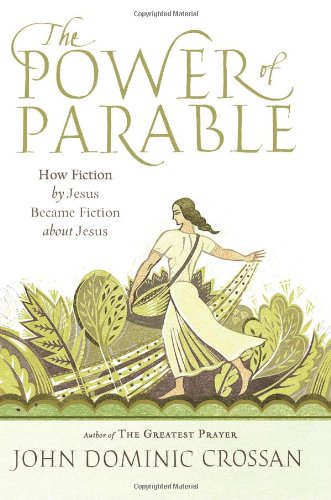Book review: The Power of Parable
by John Dominic Crossan
★★★★★
Crossan ponders, “I had observed that the parabolic stories by Jesus seemed remarkably similar to the resurrection stories about Jesus. Were the latter intended as parables just as much as the former? Had we been reading parable, presuming history, and misunderstanding both?”
In other words, are the stories of Jesus really book-length parables? Crossan presents three such parables in the Old Testament: Job, Ruth and Jonah. Ruth challenges a part of the Bible, Jonah challenges the whole of the Bible, and Job challenges the God of the Bible. But isn’t there a major difference between the Old Testament books and the Gospels? Were the characters in these stories historical, the way we think of Jesus? So Crossan presents the story of Caesar at the Rubicon as “parabolic history” to show how even historical characters can be the subject of the development of parables.
Crossan separates parables by their flavor: riddle, example, challenge, and attack parables. I found the discussion of several New Testament parables insightful, but they served only as a lead-in to the bigger topic. In part 2, Crossan takes on the four Gospels each as a whole, presenting the meaning of them as book-length parables … what they challenge, what they attack.
It is not really the historicity of the Gospels that Crossan contests, but their evangelical purpose. The undercurrent of truth, or lack thereof, is not the focus of his book; it is the way the stories are bent into parable, and what these book-length parables mean. Thought-provoking and well-written, a great read.












 354 Circles
354 Circles
 603 Goodreads Friends & Fans
603 Goodreads Friends & Fans

 Hello! I'm an author, historical Jesus scholar, book reviewer, and liberal Christian, which means I appreciate and attempt to exercise the humanitarian teachings of Jesus without getting hung up on any particular supernatural or religious beliefs.
The Bible is a magnificent book that has inspired and spiritually fed generations for thousands of years, and each new century seems to bring a deeper understanding of life’s purpose. This is true of not only Christianity; through the years, our age-old religions are slowly transforming from superstitious rituals into humanitarian philosophies. In short, we are growing up, and I am thrilled to be riding the wave.
I avidly read all thought-provoking religion titles. New authors: I'd love to read and review your book!
Hello! I'm an author, historical Jesus scholar, book reviewer, and liberal Christian, which means I appreciate and attempt to exercise the humanitarian teachings of Jesus without getting hung up on any particular supernatural or religious beliefs.
The Bible is a magnificent book that has inspired and spiritually fed generations for thousands of years, and each new century seems to bring a deeper understanding of life’s purpose. This is true of not only Christianity; through the years, our age-old religions are slowly transforming from superstitious rituals into humanitarian philosophies. In short, we are growing up, and I am thrilled to be riding the wave.
I avidly read all thought-provoking religion titles. New authors: I'd love to read and review your book!
 Hi! While Lee writes the articles and reviews the books, I edit, organize, and maintain the blog. The views expressed here are Lee's but I'm his biggest supporter! :-)
Hi! While Lee writes the articles and reviews the books, I edit, organize, and maintain the blog. The views expressed here are Lee's but I'm his biggest supporter! :-)
Connect With Me!